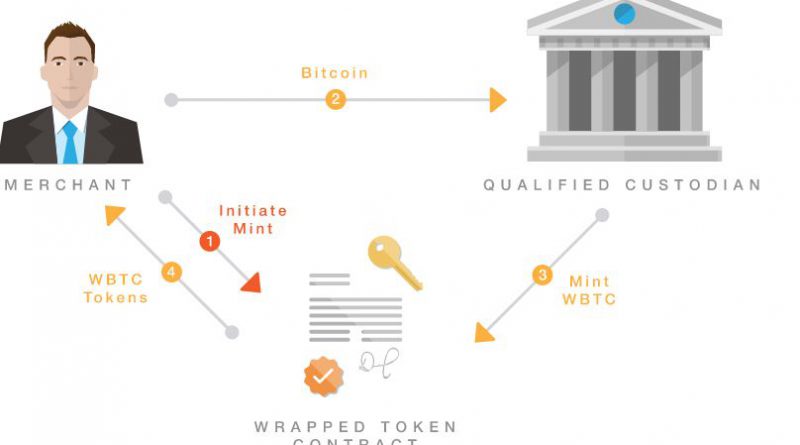Wrapped BTC to make Bitcoin more usable in Ethereum ecosystem
The Kyber Network is joining hands with the Republic Protocol, and BitGo to introduce a token known as Wrapped Bitcoin, which will be compatible with the Ethereum blockchain. It will be an ERC20 token, and will, therefore, create smart contracts for Bitcoin, and it will be backed with a 1:1 ration by Bitcoin reserves. WBTC will be introduced next year.
It will make Bitcoin more accessible and usable inside of decentralized applications, which is an essential link between the two blockchains. It could also open Ethereum to more than 60 percent of the entire crypto market according to DDEX Co-founder Bowen Wang.
The CEO and co-founder of the MakerDao network said that the network’s developers are considering using Bitcoin as collateral for Dai as one use case of WBTC. He said that the development would "unlock a whole universe of utility for Bitcoin" and gives users of Ethereum direct access to "world's largest digital asset" or Bitcoin.
Working like a stablecoin, it will have more price stability just like the stablecoins that are backed by USD.
Combining the best of BTC and Ethereum networks
The development will target at making Bitcoin more usable inside of Ethereum ecosystem such that, for instance, it will be possible to move BTC between exchanges and platforms based on Ethereum protocol, with much ease. It will make it possible to use BTC inside of decentralized exchanges and bring more liquidity to Ethereum-based decentralized exchanges and financial applications, most of which currently suffer low trading volume and liquidity.
For instance, BTC is widely accepted than all Ethereum tokens and most of cryptocurrency transactions currently take place in centralized exchanges through Bitcoin. On the other hand, Ethereum network is faster than BTC network, has smart contracts, and has more token options than BTC and ideally. For traders, that would mean they get more liquidity and participation in the Ethereum network while BTC users can take advantage of the faster transactions through WBTC smart contracts. BTC users can participate in Ethereum markets without worrying of liquidity or losing value of their BTC.
Currently, most of the existing decentralized exchanges, i.e. about 250 of them, as well as many Ethereum-based decentralized apps, do not offer trading pairs with Bitcoin and are likely to be the major beneficiaries of this development. For a Bitcoin user intending to use these DEX, he would have to use BTC to first buy the platform token and then access trading pairs of the platform token (Eth or other coins). Now, these platforms will be able to support WBTC and offer WBTC pairs, meaning the Bitcoin user would need to purchase WBTC tokens directly and participate like he or she was using Bitcoin all without losing value since WBTC is sold on a 1:1 ratio to BTC.
Again, currently, most (almost all) platforms offering direct exchange from crypto to fiat use a Bitcoin as the primary fiat link. A user on these platforms who is intending to change an altcoin to fiat will in most cases need to transfer it to a platform that facilitates selling it for Bitcoin (hence spending more money) if the platform does not offer that option, and then cashing it out for fiat. Now, they will have the option of exchanging it for WBTC if a platform offers that option and then exchanging it on a 1:1 ratio with BTC to cash out or may be changing WBTC for fiat.
It will be like opening up these platforms to capital in Bitcoin markets that holds more than 50 percent of the entire crypto market.
Dentralized exchanges, wallets, and payment services will be able to handle BTC on Ethereum nodes without having to handle multiple nodes or multiple cryptocurrencies that have different transaction formats. Creating Bitcoin smart contracts through the token will make it easier to write smart contracts that integrate Bitcoin transfers. It improves from atomic swaps because while atomic swaps facilitate swapping of Bitcoin with other altcoins, it is not natively usable for smart contracts. Dapps will be able to apply it as a BTC smart contract and so apply Bitcoin payments for lending protocols, funds, prediction markets, and token sales.
Having considered available options such as PeaceRelay, atomic swap and possibility of a federation, the company said in a blog post that the journey to an ideal decentralized solution would take several iterations. They considered it important to advance a "technically appropriate approach that can be put into functional applications right now" and one that adheres to as many principles of the decentralized movement, " creating the ecosystem foundation for future steps."
Custodians, merchants and DAO
The token ecosystem will have merchants who will basically be selling and distributing these tokens; regulated custodians who will provide security for the WBTC basically by having it filly backed with BTC on-chain reserves; and a WBTC DAO which will be the institutions to hold keys to the multi-sig contracts that control the addition and removal of merchants and custodians. Users will be able to buy WBTC from merchants using BTC and then use it on Ethereum ecosystem.
When it launches, the partners are planning to introduce it through MakerDAO, Dharma, Airswap, IDEX, Compound, DDEX, Hydro Protocol, Set Protocol and Prycto, Gnosis, Radar Relay and Blockfolio as launch partners. These launch partners will create awareness through a wide variety of adoption including DEXs, collateral for stablecoins or lending, ICO contributions and decentralized payments.
Kyber wiIl serve as the initial provider of liquidity to better facilitate the exchange of WBTC on their platform, like any other ERC20 tokens at launch. Users will be able to purchase it directly from the platform, and developers of wallets, websites and DApps who have integrated Kyber will have their users being able to use WBTC directly on their platforms.


